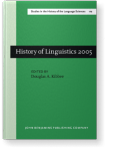Privileged languages and others in the history of historical-comparative linguistics
In historical-comparative linguistics some languages commonly hold a special, privileged position. I consider several cases of this type and the effects of such privileging on historical-comparative linguistics. The best documented case is that of Sanskrit, whose “deprivileging” in the late 19th century led to an improved understanding of PIE phonology. My major focus is on Dravidian, whose southern literary languages are commonly considered closest to the proto-language. Steever (1988) has shown that certain syntactic constructions are preserved better in the northern, “tribal” languages. I have adduced further examples of syntactic innovations in the southern languages (Hock 2001). The privileging of southern Dravidian thus turns out to be a similar mistake as the earlier privileging of Sanskrit in Indo-European linguistics. I conclude by noting that similar problems characterize much of synchronic linguistics, where standard languages and, sometimes, certain regional dialects take precedence over the majority of regional and social dialects.
